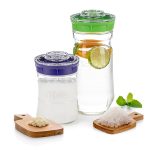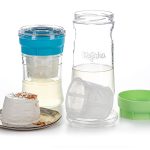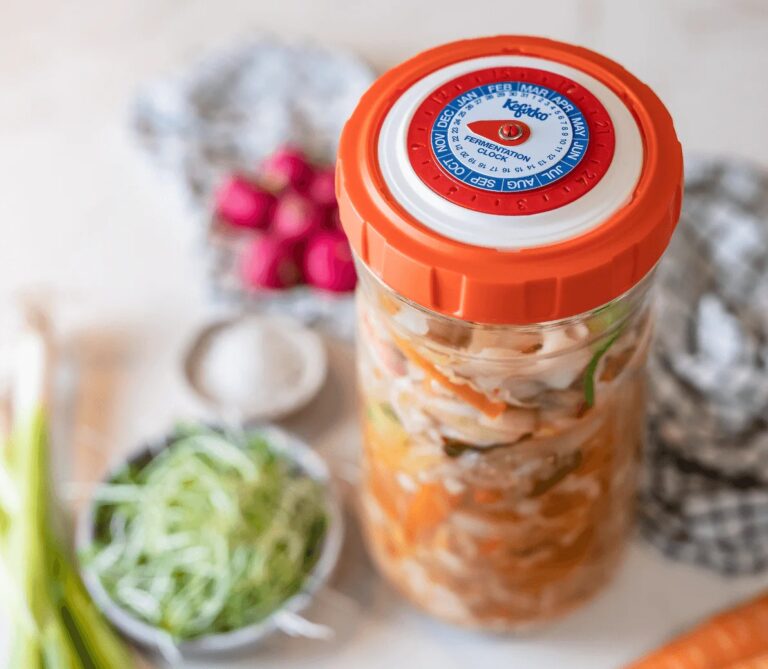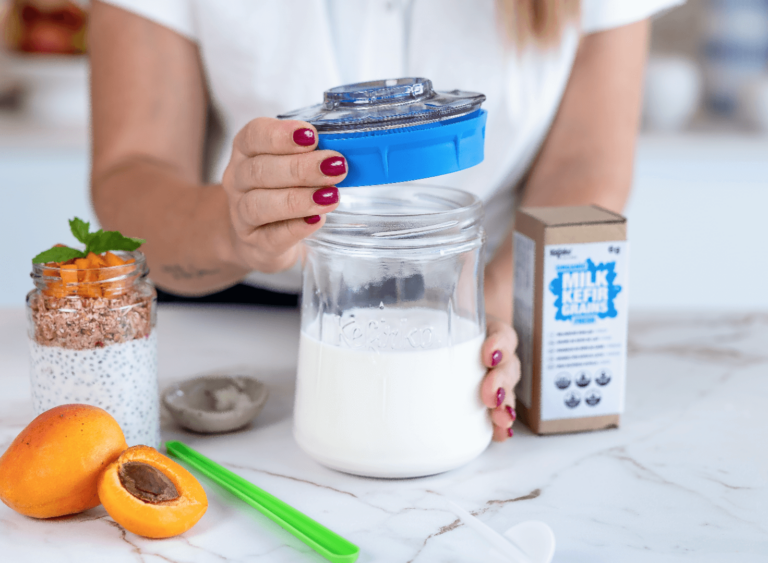Fermented food during pregnancy and infancy
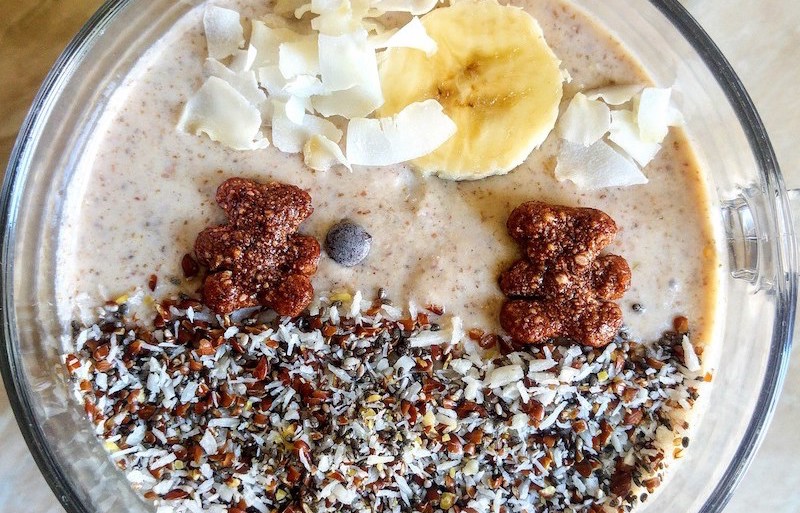
Fermented food – is it recommended for pregnant women and small babies?
What a mother eats very much affects breast milk quality. One thing that repeatedly comes up in studies is the importance of a vibrant digestive microbiome in the breastfeeding mother. Not only is a healthy gut a common theme in breastfeeding nutrition. It is also connected to all aspects of health and immunity. And this really comes into play as soon as the baby is born.
How the gut microbiome develops with babies
Before a baby is born, its gut microbiome is fairly simple. Studies on fetal microbiome development before birth have found the presence of healthy bacteria in amniotic fluid, but not specifically colonized in the gut. It is during and right after delivery that a baby’s gut becomes populated with bacteria strains. Baby ingests them while passing through the birth canal, from the mother’s vaginal strains, via the skin when placed skin to skin, and through breastfeeding.
It is during and right after delivery that a baby’s gut becomes populated with bacteria strains.
Breast milk strengthens the colonisation and maturation of the bacteria that is already present in the gut. And it also brings its own special variety of bacteria into play. Breastfeeding mothers in their quest to produce milk can make sure that their own gut is flourishing during pregnancy and afterwards. One of the ways to get probiotics from food is through drinking kefir.
A way to ensure that babies get enough of the good bacteria to protect their organisms is to ingest kefir daily. Just one tablespoon of kefir contains up to 50 billion probiotic organisms.

- Breastfeeding mothers should consume a variety of fermented foods to ensure a quality milk for their baby.
Consume fermented food during pregnancy
Introducing probiotic-rich fermented foods during pregnancy can also provide lifelong benefits. Namely, such foods:
- create a healthy internal ecosystem – fermented foods set up the foundation for a healthy and strong gut.
- provide more nutrients – when fermented, nutrients in food increase a hundredfold. The microflora that are abundant in unpasteurized, fermented foods act like enzymes. This helps properly process the food and release all the nutrients to be absorbed. They also help to retain those nutrients so that your blood delivers the best possible nutrition to each growing cell in your baby’s developing brain and body.
- improve digestion – microflora in fermented foods increase the bioavailability of each meal by improving digestion.
- reduce damage from sugar – microflora enjoy the sugars in food and protect you from the damage often caused by sugar.
- control cravings – fermented foods help control cravings for carbohydrates. They also provide the sour taste that so many pregnant women intuitively crave.
- help the body detoxify – microflora will attack toxins, combat parasites, and restore the acid/alkaline balance of your intestines.
- help babies digest their mother’s milk – mother’s milk is nature’s most perfect food for babies. But a healthy internal ecosystem needs to first be established so that a baby can digest the milk.
How to start? Take baby steps!
Eating probiotic rich foods is one of the best things you can do to impact your child’s health. While breast milk contains healthy fat and bacteria, the food most commonly used to feed babies lacks both! Fermented foods are like “food as medicine”. They aid digestion, support immunity, and actually increase the nutritional content of foods. They are recommended for babies born via C-section, who have been given antibiotics, those with gas, constipation or other stomach troubles.
While offering a variety of foods to children helps broaden their palates, “sour” is one of the flavours that we seldom give to babies. Thus, traditionally fermented foods are a wonderful way to introduce sour flavours. Many children consume highly processed foods that are overwhelmingly sweet and salty. Offering fermented foods to babies from an early age once they have started with solids can actually lessen their desire to over consume sweet foods.
If you want to avoid feeding cow milk to your baby under 1 year, you can use goat milk instead to prepare kefir.
We are made up of more bacteria cells than human cells and the “good guys” proliferate when we consume fermented foods. While probiotic supplements can be beneficial, they only offer a few different strains of bacteria. Fermented foods offer a much more diverse range of good bacteria and increase a wider variety of the “good guys” in your gut.
Fermented foods should be introduced gradually, starting with very small amounts. Children might make a “sour” face at first but will maybe then surprise you by reaching for more right away. Remember that this is just a new flavour for them to adjust to. It may take several tries for them to acquire the taste. If they initially reject the flavour, try offering it again in about a week or so.

- Drinking kefir is beneficial for very young kids. Smoothies are usually best way to introduce milk kefir to them.
Development of healthy gut in babies
One of the most important steps you can take that will determine the health and long-term wellness of your baby is to ensure the proper development and maintenance of your baby’s internal ecosystem. A healthy internal ecosystem is when your baby’s intestines have a proper balance of beneficial microflora (good bacteria and beneficial yeast). Microflora play an important role in conquering pathogenic viruses, bacteria and yeast. This is how Mother Nature “vaccinates” your child and helps build its immunity.
In addition to keeping pathogens under control, microflora also play a vital role in ensuring that your baby digests mother’s milk. This way the baby will start to thrive on this new food and begin to gain weight quickly. Because a baby’s brain is still very much under development, the mother’s nutrient-rich milk will help nourish the child’s brain. Also it will influence its level of intelligence for the rest of the baby’s life. Also, the calcium and phosphorus in a mother’s breast milk will help build strong healthy bones and teeth.
Help create healthy microflora in your baby’s gut
The missing link in the health of many babies born today is establishing the presence of a healthy internal ecosystem where good microflora outnumbers the bad.
In order to have a healthy internal ecosystem, a baby depends on the mother to inoculate it with healthy microflora at birth. While this may seem easy, often poor diet and lifestyle habits rob women of the healthy microflora so critical for a baby’s internal ecosystem.
Babies who lack an abundance of beneficial bacteria start life with painful gastrointestinal pain such as gas, colic and reflux. They can also experience infant constipation. They do not develop the necessary immunity. Also they do not have the ability to cleanse out toxins inherited from their parents and grandparents.
As 80% of the immune system is located in the gut associated lymphoid tissue (GALT). Babies who do not quickly develop a healthy internal ecosystem in their gut have weakened immunity. They are also more vulnerable to allergies and other more serious problems.
There are cultures around the world have long known about the benefits of fermented foods and drinks to a baby’s nutrition. For example, in Russia, they include drinking kefir in the diet of children from six months of age.

- After children eat all variety of foods, you can use exotic fruits to add flavour to your smoothies.
Story about how kefir can improve your kid’s health
I came across Donna Schwenk’s story how she introduced drinking kefir into the daily diet of her family and transformed the health of her family. You can watch Donna’s compelling story: VIDEO.
Here is the excerpt:
“But when my third child was born almost 7.5 weeks early and with an immune system that was struggling, I knew I had to do something to help her. I found kefir and began giving her a tablespoon in every bottle and her life transformed. Kefir changed everything. She thrived and never had one ear infection, nor did she ever go to the doctor because of sickness – not once – and she is now seventeen. When she was born, the doctors told me she had a weak immune system and would probably always struggle with sickness, but I believe the cultured foods changed all that.”
I hope this information is beneficial for you and your whole family!
Enjoy your homemade kefir daily <3
This post was written by our guest blogger Vedrana Orlović from Kefirolicious.
